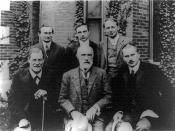There are focuses specific problems that a teen faces as opposed to the problems, that an adult or child does in the grieving process. Although teenagers and children are exceptional groups in the mourning paradigm (because their very selves are still developing) teens possess cognitive abilities that children do not. Their thought processes can be likened more to an underdeveloped adult, as opposed to an overdeveloped child. This is not only biologically apparent in terms of physiological development but also in the expectations and challenges that society presents to teens in the social and emotional arena of life. Teens are beginning to rely more on their peers and their own selves, rather than on a parent. They are expected to demonstrate increased maturity and, superior, (when compared to the child stage) decision making skills. It is safe to say that the emotional and identity, seeds that have been implanted in them in childhood, are beginning to ripen.
They are seeking nourishment and understanding (even if they do not fully realize it). Their roots are spreading and reaching for strongholds that will or at least are supposed to give them a "base" that will last the rest of their lives (Balk).
We will see that some of the challenges that bereaved teens face such as; suicidal tendencies, melancholia, anxiety, impaired abilities and impaired abilities to create meaningful relationships; and the risk of being diagnosed and prescribed medication for depression (Naish). This paper not only hopes to extrapolate on the symptoms that a teen may experience after the loss of a parent, but also emphasize the importance of the teen's receiving proper support and counseling and to help one recognize what the content of that support should be. Teens that have lost a parent or both parents often cope by using suppression...



Wonderful
well written, constructed well. I felt the author really tackled the subject
2 out of 2 people found this comment useful.